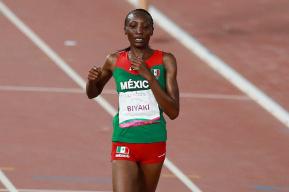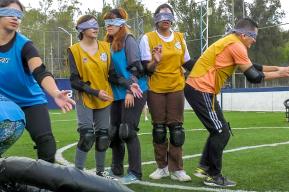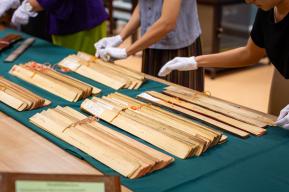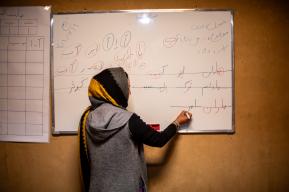Persons served
Knowing how to read and write is power. It is also a pleasure. For example, María Alicia Andrea Aldana is 75 years old and although she used to be unable to read messages or notices sent to her home, now she can. This is thanks to one of the literacy campaigns run by the Centro Universitario de Participación Social (CUPS – University Centre for Social Participation) of the Meritorious Autonomous University of Puebla (BUAP) in Mexico. Now María Alicia enjoys reading.
“Sometimes at night, I read a little while. When I have time, I sit down and I read something. Now I can read.”
This is an example of the various situations found in Mexico. In order to address such circumstances, 20 years ago, in 2001, CUPS began its activities, launching its first literacy campaign for adults in rural communities.
This is possible thanks to the participation of BUAP students, social services providers and volunteers, and even other educational institutions in Puebla and other states. All the different players have joined the summer literacy campaigns conducted in rural communities to teach people aged 15 years and older to read and write. Classes, which use materials provided by the university, are held daily and free of charge, either at the homes of learners or in public and community spaces. The activities involved also cover other subjects in addition to literacy, such as math and geography, and extend to community projects as well.
The CUPS programme is not based on only the one-way action of teaching about words and other subjects. The programme's literacy workers also carry out activities which both consolidate and recognize local knowledge. They include, for example, the development of herbariums or of anthologies of short stories and legends, community activities, and participation in rural activities, such as harvesting in the fields or milking animals. All of these things help to promote an enriching dialogue.
“I had two students and we carried out our classes in their homes. One of the students (Juliana) was a bit older, but she was really keen to learn, and even though her eyesight wasn't very good, we tried to do things so that she could learn. In the end, she was able to write her name on her own, and she was really happy and overcome with emotion. The other woman (Paula) was very young. She would always tell me that she wanted to learn to read because her children teased her about not being able to read or write, and she was unable help them with their homework. So we would try to focus our classes so that she could explain some things to her children and deal with administrative procedures, such as those concerning her children's tuition or the medical clinic."
Knowing how to read and write, lifelong learning, is essential for equipping people with better tools to help them know their way around and improve their quality of life.
“Social circumstances challenge modes of participation, learning tools, teaching methods, our ways of understanding educational needs in contexts of violence, discrimination, deficiency and inequality [...] from there and with research, theory and practice, we try to foster collective creativity, fundamental to the principles of justice, equity, equality and respect [...]" This is part of the speech given by Mirta Figueroa Fernández, Director of CUPS at the award ceremony which was held on 11 May 2021 in the Barroco room of the Carolino building of BUAP. The Director-General of UNESCO, Audrey Azoulay, had announced the winners in September 2020.
The CUPS programme, together with other initiatives and actions in Mexico and other countries, aims to close the educational gaps still present in the world. At least 750 million young people and adults still cannot read or write. The majority are women, and 250 million children do not have basic arithmetic or writing skills. This was pointed out by the Representative of UNESCO in Mexico, Frédéric Vacheron. He also mentioned that, as part of its work, the Organization promoted lifelong learning, which is part of Sustainable Development Goal 4 of the 2030 Agenda.
Estimated data on illiteracy in Mexico
people aged 15 years and older cannot read or write
In addition, half of Mexico's illiterate population lives in the states of Chiapas, Veracruz, Oaxaca, Mexico and Puebla. This is the environment in which CUPS acts on its commitment to solidarity with village communities.
The UNESCO-Confucius Prize for Literacy will help to boost the Learning by Teaching programme's sustainability. However, it is important to remember that the literacy workers and other people who are part of CUPS collect donations and resources in order to continue their social work free of charge. For this reason, the Prize also serves as an invitation to the Mexican public, particularly the citizens of Puebla, to continue supporting institutions, organizations and groups which help to further efforts to achieve inclusive and fair sustainable development.
The UNESCO-Confucius Prize for Literacy is backed by the Government of the People's Republic of China. It supports initiatives which help rural communities and young people that do not have schooling, and in particular girls and women. Ghana's Just Commit Foundation and the General Literacy Office in Sana'a, Yemen, were also awarded the Prize in 2020.
The UNESCO International Literacy Prizes also include the UNESCO King Sejong Literacy Prize, which rewards mother-tongue education and training projects and is backed by the Government of the Republic of Korea. In 2020, it was awarded to Ageing Nepal and United World Schools (United Kingdom of Great Britain and Northern Ireland).










